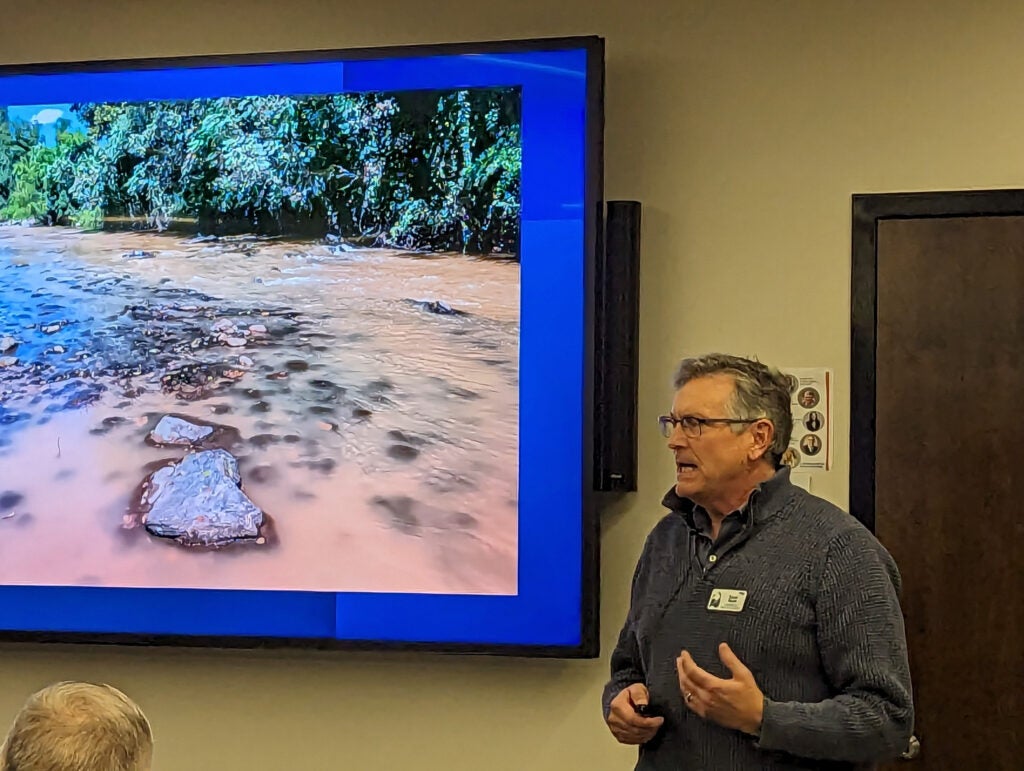Catawba College panel urges citizens to get informed and involved in water protection process
Published 12:03 am Thursday, January 25, 2024

- Yadkin Riverkeeper Executive Director Edgar Miller speaks about how reduced protection for water bodies could affect Rowan County's water sources. Beside Miller is a photo of Yadkin River taken after a recent storm that shows sediment buildup.
SALISBURY — A four-member panel hosted by Catawba College recently spoke on the effects of environmental legislation on water sources in North Carolina and beyond.
The event, titled Like an Eddy, was held inside the college’s Center for the Environment. The panel members were Executive Director Stan Meiburg with Wake Forest University’s The Andrew Sabin Family Center for Environment and Sustainability, Vice-President of Conservation Policy Manley Fuller with the N.C. Wildlife Federation, Senior Attorney Kelly Moser with the Southern Environmental Law Center and Executive Director Edgar Miller with the Yadkin Riverkeeper, Inc. The moderator for the panel was Lee Ball, executive director with Catawba’s environmental center.
Meiburg began the discussion with a presentation on the background of environmental law and specifically previous court cases involving bodies of water. The main case he pointed to as affecting recent changes in environmental law was Sackett v. EPA, a case where the Sackett family bought a property near Priest Lake in Idaho and backfilled in preparation for building a home. The Environmental Protection Agency and the U.S. Army Corps of Engineers told the Sacketts that their property was located in wetlands, meaning that the backfilling violated the Clean Water Act of 1972, the primary law governing water pollution in the United States.
“The short version of the Sackett decision of the court, in an opinion written by Justice Alito, decided that only wetlands with a continuous surface connection to a navigable water, making it difficult to tell where the water ends and the wetlands begins, are covered by the Clean Water Act,” said Meiburg.
Miller spoke to what he views as the localized effects that reduced protections of water bodies have resulted in. He supplemented his presentation with photos of the Yadkin River after recent storms, which showed the river appearing to be completely brown with mud. Miller said that he was worried about the loss of protections that have allowed the organization to monitor pollution in local waters and pointed to the recent coal ash clean-up as something that would not have been possible without the Clean Water Act.
“We’ve already got bad regulatory framework to prevent sedimentation with erosion control, no public involvement, no public process. You’ve got to go to the county commissioners or city council and stand up for your rights to protect your property and water,” Miller said.
Moser said the SELC has been watching the Sackett case and developments from it closely, as the organization views the Clean Water Act as the best tool to ensure clean and safe drinking water. She said that the act has allowed the organization to work to move the burden of pollution from the state and the public back to the polluter.
“It’s alarming and just how harmful the decision is for clean water protections, we just don’t know yet. We know it’s bad. We know that clean water protections have been severely restricted and the EPA and the corps have had their authority limited,” said Moser.
Moser said that the decision has already begun to affect North Carolina wetlands, as the state legislature put a provision into the recently passed Farm Act that ruled that wetlands that do not meet the Sackett decision are not required to be protected. That provision means that 2 million acres of wetland across the state are no longer protected, according to Moser.
Fuller spoke about how citizens can get involved in the future decision making process surrounding water protections. He said that while ongoing litigation is almost assured, the main need he sees is a public education process. He also urged members of the public to get involved with both local government and state, making sure that their opinions are heard by politicians at all levels.
“We need to use every tool in the kit, because these extremely valuable resources are under threat and Sackett has really brought this to a head,” said Fuller.



